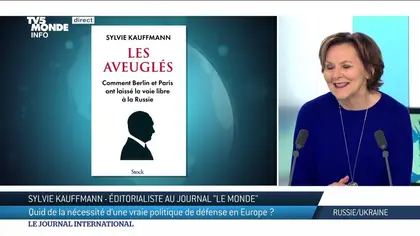Sylvie Kauffmann, long-time foreign correspondent and former editor of Le Monde has written a magnificently critical and penetrating book, Les Aveuglés (The Blindsided), about how Germany and France got everything wrong about Putin and Russia for the last quarter of a century.
Kauffmann has benefited from a vast experience covering Russian, American and European foreign policy. In the mid-1980s she was a correspondent in Moscow.
JOIN US ON TELEGRAM
Follow our coverage of the war on the @Kyivpost_official.
By and large, she reckons that Poland and the Baltic states have got it right, while Germany and France have made every mistake in the book. The Germans have been preoccupied with importing cheap Russian gas and exporting machinery to Russia, while France has lingered in great power dreams. Both have insisted on the usefulness of bilateral talks with Putin.
Apart from the two first chapters, which focus on the United States, this is a book about the foreign policy of Germany and France. The United Kingdom is given little space, but it is condemned as a safe haven for oligarch money, though more sensible on foreign policy with regard to Russia than Germany and France. Italy is almost absent.
The book contrasts the foolish policy towards Russia by Germany and France with the sensible policies of Poland and the Balts. It offers a healthy counterbalance to all writing focusing on US policy on Russia. Kauffmann’s overall verdict is that this has been “20 years of naivety, complacency, arrogance or sometimes simply negligence.”

Diane Francis Interviews Mikhail Zygar, Yaroslav Trofimov on Prospects of Russia’s War on Ukraine
At the April 2008 NATO summit in Bucharest, the US wanted to offer Georgia and Ukraine membership action plans, which Merkel and Sarkozy opposed adamantly, thus facilitating Russia’s assaults on both countries.
Her main heroes are the Polish Foreign Minister Radoslaw Sikorski, former Lithuanian President Dalia Grybauskaite, Estonian Prime Minister Kaja Kallas, and Ukrainian Foreign Minister Dmytro Kuleba, while the foremost villains are former German Chancellor Gerhard Schröder and the former French Presidents Jacques Chirac and Nikolas Sarkozy. The only Germans who are presented as positive are the Greens and among the French presidents only François Holland.
The person Kauffmann discusses the most is former German Chancellor Angela Merkel, to whom she gives a mixed assessment. She obviously likes Merkel, but she recounts how Merkel was wrong on Ukraine’s NATO accession in Bucharest 2008, on Nord Stream 2, on Ukraine in 2014 and 2022, and eventually on Putin, which is quite a severe verdict. President Emmanuel Macron is also given a nuanced treatment. Initially, Macron sounded “like a constant of the French policy: ‘We must not humiliate Russia,’” but Kauffmann appreciates how Macron has evolved from a typical French bilateral great power position on Russia to sensible opposition to Putin and support for Ukraine.
The book is nicely structured around major policy issues, such as the NATO summit in Bucharest 2008, the war in Georgia 2008, the special relation between Germany and Russia, Nord Stream 2, and the war in Ukraine 2014. Kauffmann also discusses the current war in Ukraine, ending her book in August 2023. Paris and Berlin had totally ignored the warnings about Russia from the eastern EU countries, but Putin has proven the easterners right.
Even if Kauffmann condemns the Russia policies of both Germany and France, her condemnations of the German policies hit harder, primarily because of much tighter German-Russian relations. In each case, Germany and France were wrong, while Poland and the Balts were right.
At the April 2008 NATO summit in Bucharest, the United States wanted to offer Georgia and Ukraine membership action plans, which Merkel and Sarkozy opposed adamantly, thus facilitating Russia’s assaults on both countries.
Kauffmann offers wonderful insights into Sarkozy’s actions during Russia’s August 2008 war in Georgia and notes how Sarkozy on his own sacrificed the demand for Georgia’s territorial integrity. In August 2008, the Polish and Baltic presidents had gathered in Tbilisi in support of Georgia, but with supreme arrogance Sarkozy refused to meet “the small ones,” only wanting to see the Polish president.
Kauffmann shows how the German Wandel durch Handel (transformation through trade) of Russia, the essence of Germany’s Ostpolitik, did not work, and she is devastating on Nord Stream 2 as “a fatal mistake.” Most of all she condemns Gerhard Schröder, but also his assistant Sigmar Gabriel, and Merkel does not come out well from that story. The Minsk process over the Donbas is more complex and so is Kauffmann’s verdict.
In February 2022, both Paris and Berlin were convinced that Putin would not invade until the last moment. Yet, “belatedly, the blinded have finally opened their eyes.” Kauffmann praises Germany’s Zeitenwende: “The Germans have detected that their triple dependence on Russia for energy, on the United States for defense, and on China for exports, which has allowed them to live so comfortably, has also rendered them very vulnerable.” She quotes Merkel’s words approvingly: “We have to take our fate in our hands.” But she notes that it does not suffice to just say so. Action is necessary as well.
Sylvie Kauffmann has written a vital book for our understanding of Germany and France’s Russia policy . Unfortunately, it is only available in French for the time being. It should be translated to other languages, primarily English and German, because it contains valuable insights that should become the basis of a new European policy on Russia.
Anders Åslund is the author of “Russia’s Crony Capitalism: The Path from Market Economy to Kleptocracy.”
You can also highlight the text and press Ctrl + Enter






